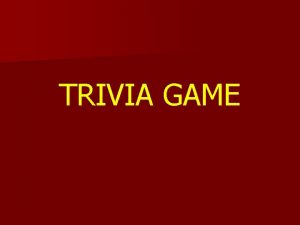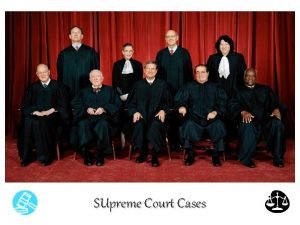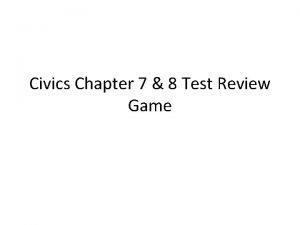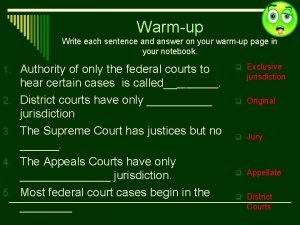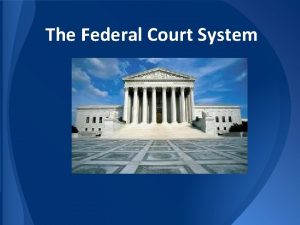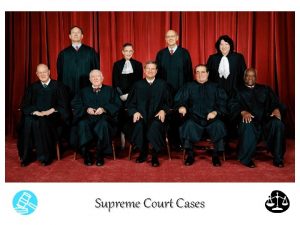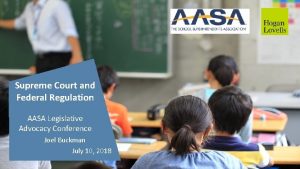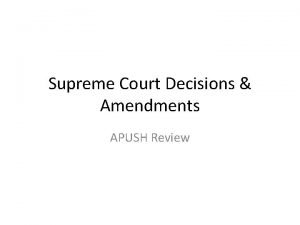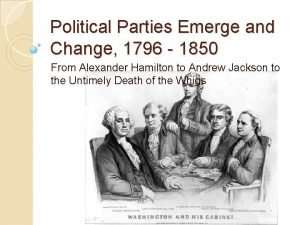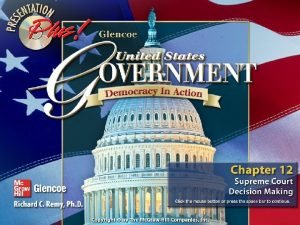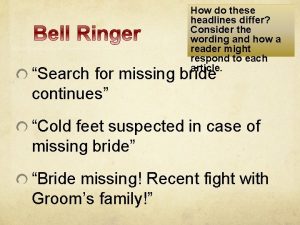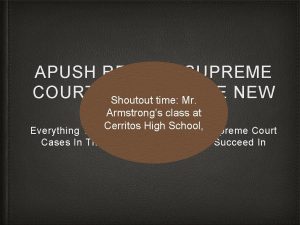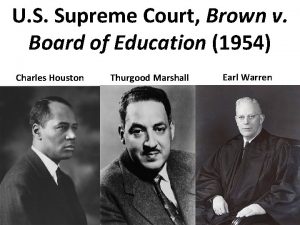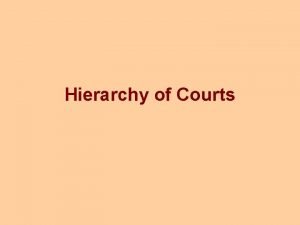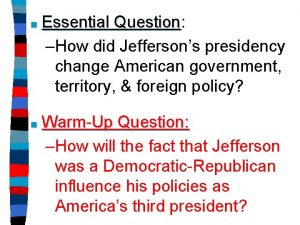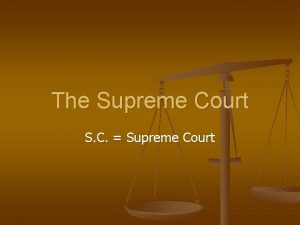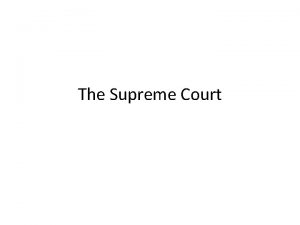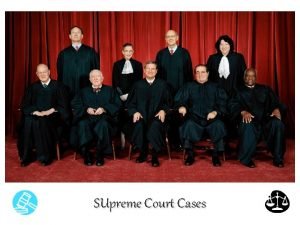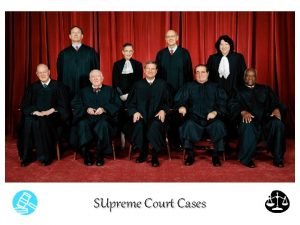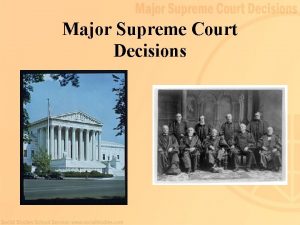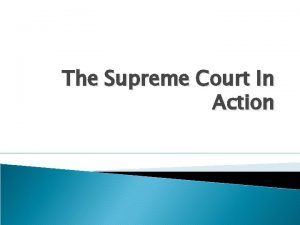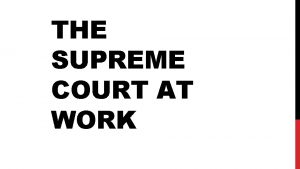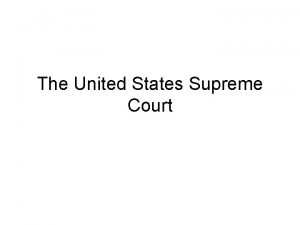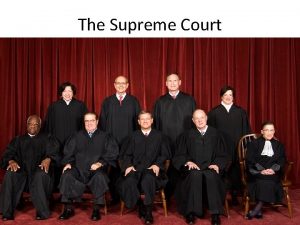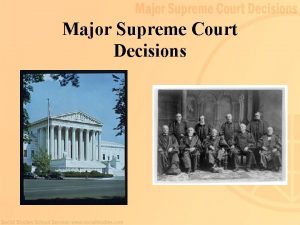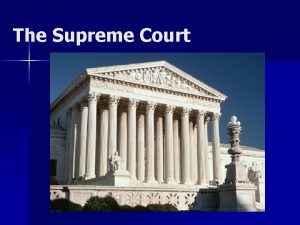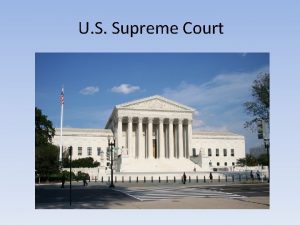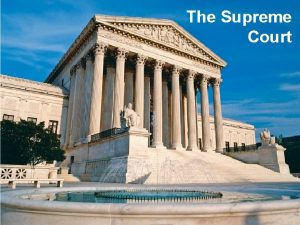Copyright in the Supreme Court Fourth Estate Rimini


![Fourth Estate Public Benefit Corp. v. Wall-Street. Com Question Presented: Whether “registration of [a] Fourth Estate Public Benefit Corp. v. Wall-Street. Com Question Presented: Whether “registration of [a]](https://slidetodoc.com/presentation_image/8e91f60245efa0d13df153b847c7f609/image-3.jpg)















- Slides: 18


Copyright in the Supreme Court: Fourth Estate, Rimini Street, and What May Be Next David O. Carson Senior Counsel, U. S. Patent & Trademark Office April 24, 2019
![Fourth Estate Public Benefit Corp v WallStreet Com Question Presented Whether registration of a Fourth Estate Public Benefit Corp. v. Wall-Street. Com Question Presented: Whether “registration of [a]](https://slidetodoc.com/presentation_image/8e91f60245efa0d13df153b847c7f609/image-3.jpg)
Fourth Estate Public Benefit Corp. v. Wall-Street. Com Question Presented: Whether “registration of [a] copyright claim has been made” within the meaning of § 411(a) when the copyright holder delivers the required application, deposit, and fee to the Copyright Office, as the Fifth and Ninth Circuits have held, or only once the Copyright Office acts on that application, as the Tenth Circuit and, in the decision below, the Eleventh Circuit have held. 9/17/2020 3

Conflict in the Circuits • 5 th and 9 th Circuits: – “Application approach”: registration has been made under § 411(a) when the copyright claimant’s “complete application” for registration is received by the Copyright Office • 10 th and 11 th Circuits: – “Registration approach”: registration of a copyright has not been made in accordance with title 17 U. S. C. § 411(a) until the Register registers the claim • Amicus Brief of the United States in support of registration approach. 9/17/2020 4

17 U. S. C. § 411(a) “… no civil action for infringement of the copyright in any United States work shall be instituted until preregistration or registration of the copyright claim has been made in accordance with this title. In any case, however, where the deposit, application, and fee required for registration have been delivered to the Copyright Office in proper form and registration has been refused, the applicant is entitled to institute a civil action for infringement if notice thereof, with a copy of the complaint, is served on the Register of Copyrights. The Register may, at his or her option, become a party to the action with respect to the issue of registrability of the copyright claim by entering an appearance within sixty days after such service, but the Register’s failure to become a party shall not deprive the court of jurisdiction to determine that issue. ” 9/17/2020 5

17 U. S. C. § 411(a) “… no civil action for infringement of the copyright in any United States work shall be instituted until preregistration or registration of the copyright claim has been made in accordance with this title. …” 9/17/2020 6

17 U. S. C. § 411(a) “… In any case, however, where the deposit, application, and fee required for registration have been delivered to the Copyright Office in proper form and registration has been refused, the applicant is entitled to institute a civil action for infringement if notice thereof, with a copy of the complaint, is served on the Register of Copyrights. …” • Court: – “If application alone sufficed to ‘ma[ke]’ registration, § 411(a)’s second sentence—allowing suit upon refusal of registration—would be superfluous. ” – “That exception would have no work to do if, as Fourth Estate urges, Congress intended … to clarify that a copyright claimant may sue immediately upon applying for registration. ” 9/17/2020 7

17 U. S. C. § 411(a) “… The Register may, at his or her option, become a party to the action with respect to the issue of registrability of the copyright claim by entering an appearance within sixty days after such service, but the Register’s failure to become a party shall not deprive the court of jurisdiction to determine that issue. ” – Court: “This allowance would be negated, and the court conducting an infringement suit would lack the benefit of the Register’s assessment, if an infringement suit could be filed and resolved before the Register acted on an application. 9/17/2020 8

Additional Grounds • • • Other provisions in the statute. – Section 410 distinguishes between application and registration. – Preregistration (section 408(f)): “A copyright owner who fears prepublication infringement would have no reason to apply for preregistration, however, if she could instead simply complete an application for registration and immediately commence an infringement suit. ” Subsequent Congressional Action – Rejection of proposal to repeal § 411(a) (1988) – Rejection of proposal to allow suit immediately upon submission of application (1993). – Preregistration (2005) Copyright Office’s gatekeeper role is inconsistent with principle that copyright subsists upon creation of a work. – Court: “If infringement occurs before a copyright owner applies for registration, that owner may eventually recover damages for the past infringement, as well as the infringer’s profits. ” – And copyright owner may seek injunction after registration. 9/17/2020 9

Petitioner’s Policy Arguments • Registration approach deprives the owner of her rights while waiting for the Office to act • Statute of limitations problems • Lengthy registration processing times 9/17/2020 10

Rimini Street v. Oracle USA Question Presented: – “The Copyright Act gives federal district courts discretion to award ‘full costs’ to a party in copyright litigation. 17 U. S. C. § 505. … The question presented in this case is whether the Copyright Act’s reference to ‘full costs’ authorizes a court to award litigation expenses beyond the six categories of ‘costs’ specified by Congress in the general costs statute. 9/17/2020 11

28 U. S. C. § 1920 Taxation of costs A judge or clerk of any court of the United States may tax as costs the following: (1) Fees of the clerk and marshal; (2) Fees for printed or electronically recorded transcripts necessarily obtained for use in the case; (3) Fees and disbursements for printing and witnesses; (4) Fees for exemplification and the costs of making copies of any materials where the copies are necessarily obtained for use in the case; (5) Docket fees under section 1923 of this title; (6) Compensation of court appointed experts, compensation of interpreters, and salaries, fees, expenses, and costs of special interpretation services under section 1828 of this title. … 9/17/2020 12

28 U. S. C. § 1821 Witness fees • Attendance fee of $40/day • Certain travel expenses, including a subsistence allowance when overnight stay is required 9/17/2020 13

17 U. S. C. § 05 Remedies for infringement: Costs and attorney’s fees In any civil action under this title, the court in its discretion may allow the recovery of full costs by or against any party other than the United States or an officer thereof. Except as otherwise provided by this title, the court may also award a reasonable attorney’s fee to the prevailing party as part of the costs. 9/17/2020 14

“Full costs” Does section 505’s reference to “full costs” override the normal rules re costs? • Sections 1821 and 1920 create default rule. • Congress may authorize awards of expenses beyond §§ 1821 and 1920, but must provide explicit statutory authority. • “Costs” generally does not include expert fees. • Copyright Act does not explicitly authorize award of litigation expenses beyond the 6 categories specified in §§ 1821 and 1920. • “Full” does not alter the meaning of “costs. ” – Full costs are the “costs” otherwise available under the law. – That means they are the costs available under §§ 1821 and 1920. 9/17/2020 15

Lessons • In construing the Copyright Act, the court will interpret the plain meaning of the words of the statute. • Policy arguments that are not grounded in statutory text are not likely to be persuasive. 9/17/2020 16

Candidates for Certiorari • Google v. Oracle America – Copyright protection for, and fair use of, computer software • Allen v. Cooper – Constitutionality of abrogation of state sovereign immunity for copyright infringement • Georgia v Public Resource. org – Copyright protection for state-sponsored annotated legal code • Capitol Records v. Re. Digi – “Digital First Sale” doctrine – Fair use 9/17/2020 17

 Is there a basketball court above the supreme court
Is there a basketball court above the supreme court Supreme court cases graphic organizer answers
Supreme court cases graphic organizer answers The u.s. supreme court works chiefly as a(n)
The u.s. supreme court works chiefly as a(n) How cases reach the supreme court worksheet answers
How cases reach the supreme court worksheet answers Indictable offence
Indictable offence Us circuit court map
Us circuit court map Which precedent was established by marbury v. madison
Which precedent was established by marbury v. madison Supreme court cases graphic organizer answers
Supreme court cases graphic organizer answers Supreme court does
Supreme court does Important amendments apush
Important amendments apush Supreme court
Supreme court Political parties
Political parties John marshall
John marshall Supreme court does
Supreme court does What do these headlines say about how the supreme court
What do these headlines say about how the supreme court Supreme court cases apush
Supreme court cases apush Supreme court
Supreme court Hierarchy of criminal courts in india
Hierarchy of criminal courts in india John marshall supreme court
John marshall supreme court
